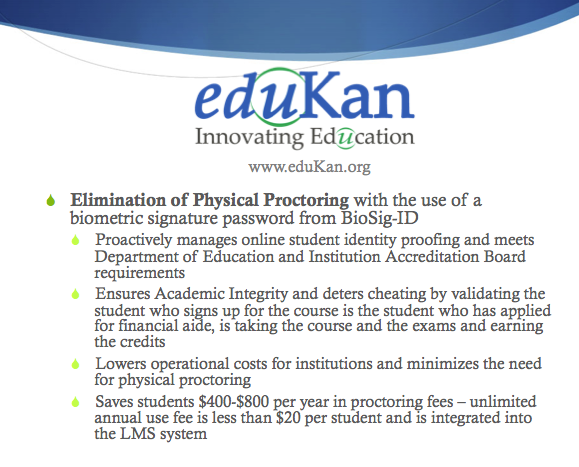At the 20th ICAI Conference’s Technology Showcase, Dr. Mark Sarver will be discussing how eduKan is using biometrics technology for student identity proofing to meet regulations, lower operational costs and maintain high levels of academic integrity for distance education.
Dr. Mark Sarver, CEO of eduKan, a consortium of colleges in Kansas, will be speaking at the International Center for Academic Integrity’s 20th Anniversary Conference. Dr. Sarver will be talking about his choice to seek out a solution for identity proofing students enrolled in eduKan’s distance education program, to maintain a high level of academic integrity and to lower operational costs associated with physical proctoring. The ICAI conference originally was to be held at Princeton University in November, but Hurricane Sandy forced a reschedule to February 26-28th, 2013 in San Antonio, Texas and will feature thought leaders who support the need to cultivate a culture of integrity in academic communities throughout the world.

Overview of Benefits of Technology used from BSI
The International Center for Academic Integrity (ICAI) was founded in 1992 to combat cheating, plagiarism, and academic dishonesty in higher education. ICAI offers assessment services, resources, and consultations to its member institutions, and facilitates conversations on academic integrity topics each year at its annual conference. The 20th International Center for Academic Integrity Conference’s theme is Influencing Culture, Advancing Integrity and is headed up by director, Dr. Teresa Fishman, from Clemson University in South Carolina and has members in 18 countries.
“We are excited to be speaking at the ICAI conference this year, representing the first distance education institution that has pioneered the use of BSI’s biometric technology for identity proofing as part of our learning management platform,” stated Dr. Mark Sarver, CEO of eduKan.
eduKan ran a pilot in the Spring of 2011 to test the viability of the BioSig-ID software for use in student identity proofing along with a plan to lower proctoring costs, protect student privacy and increase accountability while being easy to use. Dr. Sarver was able to realize a dramatic savings in operational costs and lower fees for students while proactively managing academic integrity for eduKan’s online campus. eduKan was nominated for a Sloan Consortium Effective Practice award for their advancement in using innovative technology to solve this critical need.
At ICAI, Dr. Sarver will share the key findings from the pilot, how it’s working now that it is rolled out for school-wide usage, and how eduKan is benefiting today by using BSI’s solution.
“We are on a fast growth path and needed to manage costs as our staff of six manages over 5,000 online student enrollments,” Dr. Sarver continues. “The risk-reward for adoption of innovative technologies comes down to the plan –one in which we very methodically stated clear goals and objectives to our technology partners and were able to realize them as a result of the hard work of our team’s execution.”
For more information on this conference and membership opportunities in the ICAI, please visit http://www.academicintegrity.org.
About eduKan
eduKan provides access to quality higher education, including ESL courses, via college degrees, certificates, and individual courses, with affordable online classes. eduKan was founded in 1998 as a cooperative effort between member colleges to offer courses via the Internet. eduKan’s consortium schools are all accredited Kansas learning institutions with excellent reputations and long histories of providing degrees in traditional settings, as well as through online courses. eduKan Consortium member institutions are: Barton Community College, in Great Bend; Colby Community College, in Colby; Dodge City Community College, in Dodge City; Garden City Community College, in Garden City; Pratt Community College, in Pratt; and Seward County Community College/Area Technical School, in Liberal. For more information, please visit http://www.edukan.org.


